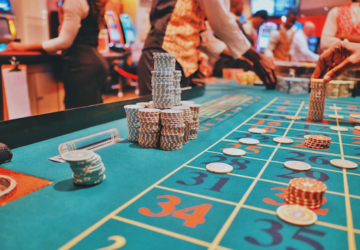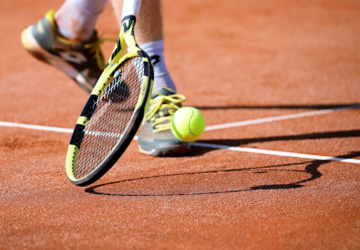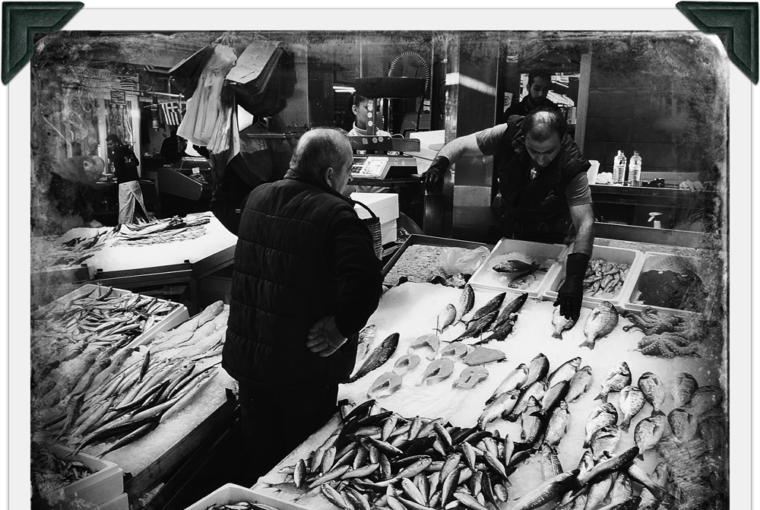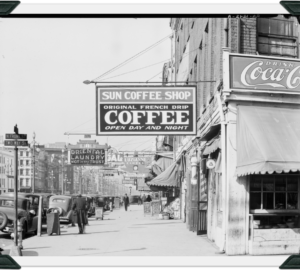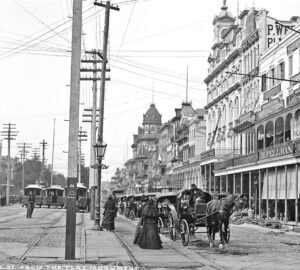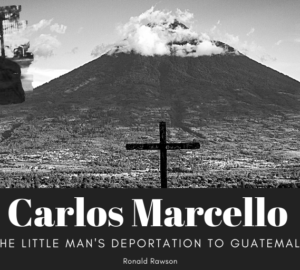Niccolo sold pots and pans from his pushcart. Well, not only pots and pans but other useful items as well. But he made his best money on those pots and pans. Since coming from Monreale to New Orleans two years earlier he had done moderately well for himself. First fishing and oystering in a lugger with a friend and then buying his own cart and supplies with the money he had saved up from that. If things kept going as well as they had been for him he should be able to rent a stall in The French Market in a couple of years and then maybe even buy a shop a few more after that. Maybe he could even afford to have a wife somewhere in there as well. But for now Niccolo was concentrating on moving along Old Levee Street, the clanging of his pans keeping time with the roll of his cart’s wooden wheels, one of which seemed to have become a little off round and created a little bumping action when it hit the cobblestones in the street. He would need to look at this after his day was done.
The man in the coat waited in the doorway on Toulouse Street. Waited for the men he knew would be this way soon. He knew what he had to do and he was determined to accomplish his task. The only thing he was worried about was how to approach the man he needed to see. He knew the body guard that the man was sure to have with him was a sharp and alert one, if anything were to go wrong it would be in the approach to complete his task.
The wheel and the bumping action it caused seemed to be getting worse and Niccolo started to worry that he may have problems. That’s something he sure didn’t need! If he can make it to the end of Old Levee Street he has a friend that lives just around the corner on Esplanade Avenue where he can stop and make a repair to get him through the day. He would look at the wheel when he made his daily stop by Jackson Square to sell what he could. Just passing Conti now, only a couple more blocks until the square. The clanging of the pots hanging from the spindle across the left side of his cart was getting louder and a bit irritating as he went. Now passing St. Louis Street. Toulouse Street and then St. Peters and he would be at the square. The wheel was definitely getting worse and was wobbling now. As Niccolo worried about the wheel on his pushcart and hoped he would make it just to Jackson Square (never mind to his friend on Esplanade) he saw a familiar figure walking along Old Levee. They were about equal distance from the intersection of Old Levee and Toulouse but on opposite sides. As a man from Monreale he owed his allegiance to Salvatore Matranga but this was the man who ran Little Palermo, despite all the recent troubles he has had. But apparently he has put those troubles behind him. It had been many weeks since Niccolo had seen him out walking the streets as was his custom. Everyone knew he had been in hiding since the troubles between him and those from Messina had broken out in shooting. But he was out today, walking with another man as if he had no cares in the world and making sure everyone that passed by saw him. Niccolo wouldn’t stop and kiss his hand, as many seemed to be doing this morning, but he would give greetings to him so as not to be in his bad graces. Personally, Niccolo wished he had stayed in hiding never to return but such was life! As they both neared the corners of Toulouse he called out “Ciao Zu Agnello! I’m happy to see you and hope you have a pleasant day!” He felt anything other than happy since the wheel was getting worse. Raffaele Agnello looked his way and gave a half hearted wave and smile as he turned the corner onto Toulouse. Niccolo had planned to turn onto Toulouse as well and stop by the Macheca shop and the bakery next door as they could usually be counted on to need something from his cart but now he was just worried about getting to the square. Zu Agnello didn’t bother to return a greeting to him. Just as Niccolo passed the opening of Toulouse he felt, more than heard, something give way on his cart. The cart lurched to one side and when it did the spindle that his pots hung from decided it would snap as well. His pots, along with a good bunch of other items in the cart, crashed to the street causing a loud noise and passers by to stop and look at the scene. As Niccolo was cursing his luck(as well as the wheel)he heard a loud blast behind him on Toulouse Street.
The man he needed to see had just turned the corner. And yes, the bodyguard was with him. The man was giving a wave to someone. In that usual arrogant fashion that he had. He wondered how this would play out. He didn’t really feel confident in his success but it had to be done no matter the outcome. They both approached his spot, unaware as of yet that he was in the doorway. Just as he was ready to step out a loud crashing sound came from the direction of Old Levee Street. The man and the body guard both looked around at the noise. The man waiting in the doorway took full advantage of Niccolo’s misfortune.

April 1st, marks the death of Raffaele Agnello in 1869. Agnello (Italian for lamb) first comes into NOLA history as part of The European Brigade which was a force made up of 340 NOLA immigrants. It’s unclear if this brigade was an actual military force (most likely) but with the occupation of New Orleans by Union forces in April of 1862 it was announced by the Mayor that the European Brigade would effectively be the policing force of the city. Raffaele Agnello was among the leadership of the brigade. Originally from Palermo Agnello claimed to be a descendant of a famous Sicilian bandit from three hundred years earlier called Agnello. It’s unclear when Raffaele immigrated to America but apparently by the time of the Union occupation he was, somewhat at least, the Mafia power in the Little Palermo of NOLA. His position in The European Brigade could only help in his control of the Italians of the city and many of them with origins in the western half of Sicily gave him the title of Zu (Zio, Ziu) meaning Uncle. Some others were less happy with his position, namely a faction that hailed from Messina, on the eastern half of the island, but they grudgingly respected him. For the time being at least.

By all accounts Agnello played the part of Godfather publicly. Often strutting through the Veaux Carre, accepting praises from those that met him and treating the citizens as if they were his children. Throughout the war years he apparently kept the Sicilian population in line and kept order on the docks. The stevedore business was big money and power and Agnello controlled the Italians in this area as was evident by a strike that occurred in 1865 among the black and white dock workers of the city. The Italian stevedores, who generally made much less than their counterparts thanks to Agnello, abstained from the strike. It’s not known when Joseph Macheca first had contact with Agnello, he certainly knew of him at least, but by the time of the strike it’s most probably certain that Agnello’s control of the Italian dockworkers, who loaded/unloaded fruit bearing vessels, impressed Macheca who was in the fruit shipping business. However, Macheca and Agnello would apparently be at odds with each other.
In 1868 Macheca organized and funded The Innocenti. A politically motivated force that mainly consisted of Sicilians though other groups were represented in the group. The Innocenti would play many parts in the years to come in NOLA but in 1868 the only part they played in Agnello’s eyes were as a rival force that jeopardized his power. The Innocenti were comprised of many of his rivals as well as his “children” and to someone who had been used to being the top power over the last several years this must have been a worrisome development. In the Fall of 1868 The Innocenti started posting guards and patrols around Little Palermo which most likely would have cut into Agnello’s profits as he provided “protection” for businesses in the area. This along with the new Louisiana Lottery (Charles T. Howard’s project, see Where New Orleans Buries it’s Dead Mobsters in The Crescent Corner) which further cut into his Italian numbers game and surely gave Agnello cause for worry. Perhaps these worries played a part on October 26 1868. A member of The Innocenti, Litero Barba who was also thought to be the leader of the Messina faction and rival to Agnello, was shot down by a shotgun blast on the corner of Chartres and St. Phillips Streets. Suspicion immediately fell on Agnello but using political upheaval and violence that had occurred in recent days between the Democratic Innocenti and the black Republican faction of the city Agnello pointed the finger at a black cigar maker and Republican state legislator named Octave Belot. Belot got wind of the accusation and went into hiding. The Innocenti searched for him without luck. Apparently they were fooled for a time but suspicion soon fell on Agnello again when in November Belot appeared before a judge to give testimony, with several witnesses to support him, that he was out of town at the time of Barba’s murder. The Messina faction came to believe that a close ally of Agnello, Alphonse Mateo, was the gunman in Barba’s killing.
Joseph Agnello, brother to Raffaele and known as Peppino, tried to reassure the Messinians that his brother wasn’t involved and in an effort to outwardly make amends and show goodwill Peppino threw a party at his house on Royal Street in mid December. Apparently things went well, though somewhat forced, between members of the two factions that night (apparently the Matranga’s and Stuppaghieri faction of Monreale declined to attend the event) until close to midnight. When the party started to break up Joseph Bonano who apparently succeeded Barba as leader of the Messinians, cornered Mateo and questioned him about his part in the killing of his friend. Mateo pulled a knife to which Bonano responded with a gun shot to Mateo’s face blowing away his nose. The shot exited from the back of his neck. As the Messinians fled the house Raffaele emerged after them and fired a shot into Bonano’s back. His friends quickly grabbed him and carried him off. Following this Macheca apparently sides with Bonano and the Messinians in the dispute. Those members of The Innocenti from Palermo leave the group to support Agnello.
Though The Innocenti had controlled Little Palermo to a large degree the loss of the members to Agnello, along with the damage to the group with the political unrest a couple of months before, had left the group weakened and Agnello’s faction started to take back control. Raffaele had gone into hiding and ran the group through his brother Joseph. Peppino gradually ran their rivals out of The French Market to The Poydras Market and in some cases out of the state. Many of the Messinians would relocate to Galveston Texas. On February 15th 1869 Peppino and some of his men, which included a miraculously recovered Mateo, stormed a house on Chartres Street and opened fired. The most likely target was Joseph Bonano who had recovered from the shot in the back as well. Though no one was seriously hurt (Bonano seems to have taken another slug though) this apparently drove Bonano and several friends to relocate to Galveston for a short time. The Agnello’s may have hounded them there as well. Bonano’s self exile would only last about a month however and he quietly returned to NOLA, and work, at the Poydras Market. When Agnello learned of this he sent Peppino and some men to kill Bonano at the market where a gun battle took place. The only person killed however was a non Italian grocer named David Clark who took a slug to the throat and died ten days later. Agnello’s men got away clean as did Bonano but two of his men were arrested and thrown into The Orleans Parish Prison. It’s not for certain what occurred over the next few days but it appears that Joseph Macheca and Zu Agnello negotiated a peace settlement. Macheca may have even offered alliance and support to Agnello given his position. Whatever the case Agnello came out of hiding on April 1st 1869 to resume his walks around Little Palermo, this one being more of a victory lap.

On a Thursday morning Frank Sacarro, godson and bodyguard to Agnello, would step out onto Royal Street. Guards already on the street signaled to him that all was fine. Agnello emerged after him and they headed towards Ursulines Street. From there they made their way to Old Levee Street (now called Decauter) and passed The French Market. As he passed many called out to him to offer support and some approached him to give his hand a kiss. They made their way past Jackson Square towards Toulouse where they turned right. Just after turning on Tolouse and (coincidentally??) just a few steps from Macheca’s shop a noise back on Old Levee distracted both Agnello and Sacarro. In those few seconds were Agnello’s death. Sacarro turned back to see a man dressed in a frock coat pointing a blunderbuss at his Godfather. Sacarro lunged toward him while drawing his own pistol but too late! It’s unclear if Agnello was aware of what was happening but in just a few seconds he lay dead on the street. Four bits of metal had punctured his skull, the rest peppered the Macheca and Norman & Reis bakery storefronts. Two wounds in the right temple, one in front of the right ear and one just below the ear all bled out Agnello’s life. Sacarro, who had been caught by a chunk of lead on his left index finger, gave chase to the man as he fired and and wounded him. They ran through the Norman & Reis bakery but the assassin managed to escape through the rear exit. A baker named Frank Phillips was wounded in the right leg in the chase. Sacarro re-emerged from the bakery to cradle his Godfather and he cried over the body until police arrived. The police brought Sacarro to headquarters where he gave a description of the assassin and to say he was sure that he had wounded him. Two and a half months later police arrested a man named Joseph Florada at the Poydras Market. Sacarro demanded to see the prisoner upon hearing this but he told police that Florada was not the killer. Whether or not this was Omerta being displayed is unknown but another name that Florada used was Gaetano Arditto and under this name would be one of the assassins of Antonio Labousse a little over a decade later in events surrounding Giuseppe Esposito and his capture by the Hennessey cousins (See An Oysterman Gets Shucked in the Crescent Corner).

And so ended the life of New Orleans (and most likely America’s) first Godfather. History doesn’t tell us what the noise was that Agnello and Sacarro turned to look at. Neither does it tell us who the gunman was. Was the noise an intentional distraction? Was Florada/Arditto the gunman? Was Macheca in on setting Agnello up? Just some guess work but if Florada/Arditto was the gunman then Peppino didn’t seem too anxious to take revenge. More likely he would take revenge on the man who was responsible for ordering his brothers death, Joseph Bonano. It’s quite possible Bonano and/or Macheca knew Agnello would turn onto Tolouse that day to parade by the Macheca storefront. Given Agnello’s ego and penchant for having people show him respect it was almost a given.
Much has been made about Joseph Macheca. Many claim he was actually the first Godfather but there’s really no evidence to support this. There is a lot to support however that he certainly liked to associate and do business with Mafia figures. And like so many that like to hang out with those types it would cost Macheca dearly down the road.
Peppino would take over his brother’s operations. But April would be a bad month for Joseph Agnello as well.
- What’s This Silver Dollar Shit! That’s Sam Carollo! - June 26, 2023
- New Orleans Sets a Record - April 11, 2022
- Carlos Marcello Takes A Vacation: The Little Man’s Deportation to Guatemala Pt. 2 - June 11, 2021
